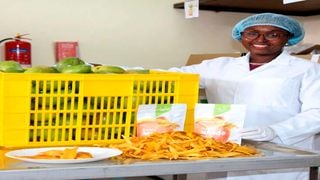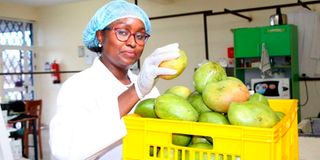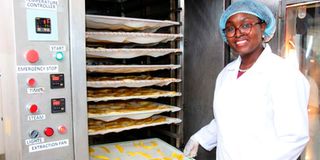
Pauline Okubasu showing some sample products of Azaavi Foods made out of dried mangoes.
| Richard Maosi | Nation Media GroupSeeds of Gold
Premium
I turn fruits into tasty dried snacks
What you need to know:
- Pauline says she came to learn of fruit drying while working with an airline.
- In five years, Pauline hopes to be one of the entrepreneurs contributing to sustainable development goals.
Kyumbi, tucked in Machakos County, is a dry area with scanty vegetation and sparse population. The sun, they joke, wakes up and sleeps here.
But there are gems here. Some 400 metres from Kyumbi trading centre one finds Azaavi Foods, owned by Pauline Okubasu.
Her workers are busy offloading crates of fresh mangoes ferried from farmers in Makueni when the Seeds of Gold team arrives.
Pauline is the director and founder of Azaavi Foods, which adds value to fruits, particularly mangoes, to end up with tasty dry snacks.
"Since most fruits are seasonal, we chop them into pieces and dry to make snacks. We started with mangoes but we have now added pineapples and pixie oranges,” she says.
The fruits are sourced from smallholder farmers in the region, says Pauline, a former marketer with an airline and a mother of three.
Pauline recounts that she came to learn of fruit drying while working with the airline, particularly when she toured countries in the Far East.

Pauline Okubasu at her value addition start-up in Kyumbi, Machakos County.
"I would buy the dried fruits and bring to my colleagues who asked me where they could get them locally, but they were not available,” she recalls.
Thus, in 2017, she resigned from her job and enrolled for a value addition course at the Kenya Industrial Research and Development Institute (Kirdi) in Nairobuito acquire skills on drying fruits.
Later, Kirdi incubated her for one-and-half years until her products were certified by Kenya Bureau of Standards (Kebs) .
She later trained with Switch Africa Green under the United Nations to know what makes good quality mangoes.
“I began the business with Sh20,000 from my savings, with the money going on buying 10kg of pineapples and six kilos of mangoes for drying. Since then, I have been growing,” she says.
With support from her husband, Pauline last year bought modern dryers, stainless steel tables, weighing machines, cutting tools and packaging machines to expand her business. She sources her mangoes from Machakos, Makueni and Kitui counties, depending on the season.
“We dry 500 kilos of mangoes weekly that we get from contracted farmers at Sh40 per kilo. We also dry 200 kilos of pineapples sourced from Malindi and Homa Bay and some 150 kilos of plantain bananas we get from Kisii and Kirinyaga.”
Major challenges
Once farmers harvest the mangoes, they are transported in crates to her premises, where they are sorted to ensure only good ones are picked and then weighed.
"The mangoes are then washed thoroughly, peeled, sliced and dried for eight hours using electric machines and packaged for distribution," says Pauline, who has employed four youths.
She also makes plantain and matoke crisps and dried pineapples, with all the products branded Azaavi Foods.
She adds that from the fruit peels, she makes organic manure and also animal feeds.
She sells 100 grams of dried mangoes at Sh250, while the same quantity of pineapples and pixies at Sh100.
“Most of my sales come through social media platforms Facebook and Twitter while others from referrals.”
For such a business to excel, she has joined various associations for mentorship and networking. They include Switch Africa Green and Horti-Green.
One of the major challenges she faces are frequent power black outs, an interruption that sometimes makes her mangoes go bad, especially when the produce is plentiful during the peak period.

Pauline Okubasu displays her modern fruit drier at Kyumbi in Machakos County.
In five years, Pauline hopes to be one of the entrepreneurs contributing to sustainable development goals and promoting youth employment.
Samwel Nguka, a food security and sustainable agriculture specialist with Vixam Agribusiness, says value addition creates an opportunity for prolonging the shelf-life of farm produce.
“Improving post-harvest handling automatically boosts the quality of fruits and decreases losses as waste is limited putting more money in farmers’ pockets.”
He asks farmers to take caution when harvesting mangoes, pineapples, pawpaws and oranges to ensure fruits are not injured or fall on the ground, what lowers quality.
"Fruits are living tissues that are bruised easily therefore they should be handled gently. Extra care should also be taken to avoid over-packing," he says.
In addition, fruits are sensitive to the sun and should be placed immediately under the shade or in a cool and dry place to avoid deterioration.
Before one invests in such a venture, Nguka says they must do market research, training on value addition, source of quality fruits and seek a ready market for the dried products.





